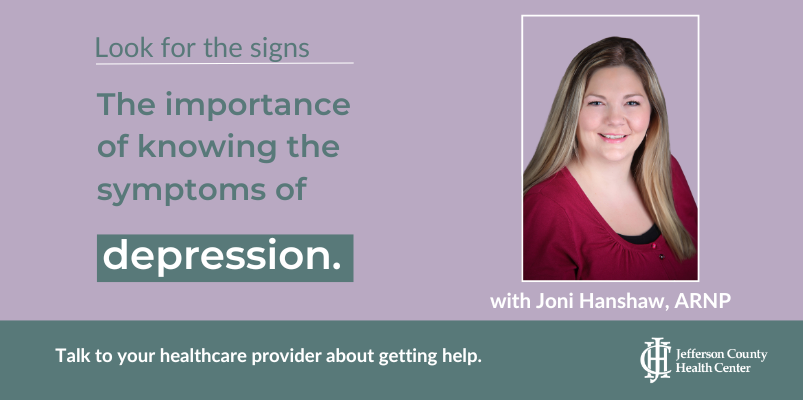Understanding Depression & Taking Action
May 16, 2024

Depression is a pervasive mental health issue affecting millions worldwide, yet early recognition of its signs is often the first step towards effective intervention and management. As Joni Hanshaw, a dedicated Nurse Practitioner at the JCHC Clinic, emphasizes, "Understanding depression and its manifestations is crucial for promoting mental well-being in our communities." With this in mind, let's delve into the multifaceted nature of depression, explore proactive strategies for self-care, and highlight the importance of seeking professional help when needed.
Understanding Depression:
Depression affects millions globally, and early recognition of its signs is vital for effective intervention and management. According to Joni Hanshaw, "Recognizing the signs of depression empowers individuals to take control of their mental health and seek appropriate support." Symptoms vary among individuals, but common indicators include persistent sadness, loss of interest in activities, changes in appetite or weight, sleep disturbances, fatigue, feelings of worthlessness or guilt, difficulty concentrating, and thoughts of death or suicide.
Taking Action:
If you or someone you know experiences several of these symptoms for over two weeks, it's important to take action. Joni Hanshaw advises, "Don't underestimate the significance of persistent symptoms. Early intervention can lead to better outcomes and improved quality of life." Depression significantly impacts daily functioning, relationships, and overall well-being, transcending transient feelings of sadness to become a pervasive state affecting all aspects of life.
Self-Care Strategies:
Self-care plays a pivotal role in depression management, as highlighted by Joni Hanshaw: "Establishing self-care routines is essential for maintaining stability and promoting resilience against depressive symptoms." Regular exercise releases endorphins, improving mood, while a balanced diet and quality sleep provide essential nourishment for both body and mind. Engaging in enjoyable activities and spending time with loved ones can also alleviate symptoms and enhance mental well-being.
Seeking Professional Help:
Recognize when professional support is necessary, as Joni Hanshaw emphasizes, "There's no shame in seeking help for depression. It's a sign of strength to reach out for support." Consulting a therapist, counselor, or mental health professional offers valuable guidance and resources tailored to individual needs. In some cases, medication may be prescribed to alleviate symptoms and restore equilibrium.
Urgent Intervention:
If you or someone you know experiences suicidal thoughts or self-harm tendencies, seek immediate medical attention. Joni Hanshaw stresses, "Suicide is a serious concern, but it's preventable with timely intervention and support." You're not alone; compassionate individuals are available to provide assistance and care during difficult times.
Connect with JCHC Clinics:
Recognizing depression signs and proactively seeking assistance are crucial steps in managing this condition. Our providers at JCHC Clinics, including Joni Hanshaw, are committed to supporting you on your healing journey. Call 641-472-4156 to navigate care and access resources tailored to your individual needs.